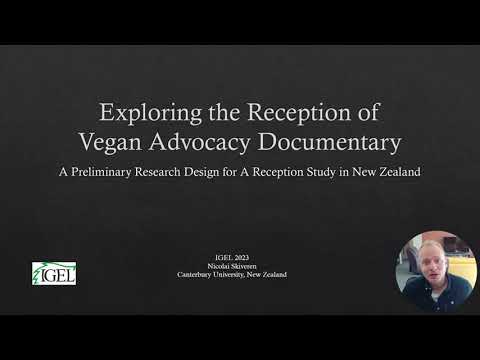 Speaker: Nicolai Skiveren
Speaker: Nicolai Skiveren
 Affiliation: Aarhus University, Denmark
Affiliation: Aarhus University, Denmark
Title: Exploring the Impact of Food Documentaries: A Preliminary Research Design for Two Case Studies in the New Zealand Context
Abstract (long version below): Empirical ecocriticism is an emerging field that combines insights from the environmental humanities with methods from environmental communication and the empirical study of literature in order to study the impact of environmental narratives in literature, film, television, video games, and other media on attitudes, emotions, perceptions, and behavior (Małecki, 2019; Schneider-Mayerson, Weik von Mossner, et al., 2020). While still relatively new, the field has already generated significant interest in academia and beyond, with special journal issues and edited collections devoted to it (Schneider-Mayerson et al., 2023), as well as media coverage by the likes of Newsweek or Psychology Today. This interest is mainly due to the exciting output generated by empirical ecocriticism on the potential of stories to move the public on today’s most pressing environmental issues such as climate change, species extinction, and animal welfare (Brereton & Gómez, 2020; Iossifidis & Garforth, 2022; Małecki et al., 2016, 2019; Malecki et al., 2021; Myren-Svelstad, 2023; Sabherwal & Shreedhar, 2022; Schneider-Mayerson, 2018; Schneider-Mayerson, Gustafson, et al., 2020). This symposium focuses on the latter topic, providing new empirical data, both qualitative and quantitative, on the impact of animal stories in video games, literature, and film on perceptions of animals and attitudes toward animal welfare.

 Long abstract
Long abstract
Among environmental scientists, the impact of the food industry – especially meat, dairy, and fish – is often described as one of the most crucial challenges of the contemporary ecological crisis (Vale & Vale 2009, 2013; Hedenus et al. 2014). With food production accounting for 26% of global CO2 emissions (Ritchie & Roser 2020), the question of what we eat has never been more relevant. Throughout the past decade, filmmakers have sought to raise awareness of this fact, as seen, for example, in documentaries such as Cowspiracy (2014) and What the Health (2017). This effort has not gone unnoticed by media-oriented ecocritics, who have expressed optimism about the rhetorical effectiveness of such films (Lindenfeld 2010; Weik von Mossner 2021a, 2021b). Yet without empirical evidence, the question of whether such documentaries do in fact have an impact on those who watch them, under what conditions, and why (not), is a question that still remains to be answered. This paper explores such topics, as it presents a preliminary research design for two qualitative and empirically grounded reception studies of the recent documentaries Milked (2021) and Seaspiracy (2021). The studies will be conducted as part of the speaker’s forthcoming postdoctoral project in New Zealand (centered on qualitative empirical ecocriticism). As such, the presentation is intended as an opportunity to receive feedback and criticism and to reflect on issues related to validity and reliability as well as generating cohorts for the project that might produce rich and novel findings.
References
Vale, B., & Vale, R. (2009). Time to eat the dog: The real guide to sustainable living. Thames & Hudson.
Vale, B., & Vale, R. J. D. (Eds.). (2013). Living within a fair share ecological footprint. Routledge.
Hedenus, F., Wirsenius, S., & Johansson, D. J. A. (2014). The importance of reduced meat and dairy consumption for meeting stringent climate change targets. Climatic Change, 124(1–2), 79–91.
Ritchie, H., and Roser, M. (2020). Environmental Impacts of Food Production. OurWorldInData.org. Retrieved September 9 2022 < Environmental Impacts of Food Production - Our World in Data>
Lindenfeld, L. (2010). Can Documentary Food Films Like Food Inc. Achieve their Promise? Environmental Communication, 4(3), 378–386.
Weik von Mossner, A (2021b). Screening veganism The production, rhetoric, and reception of vegan advocacy films. In L. Wright (Ed.), The Routledge handbook of vegan studies (pp. 309-318). Routledge.
Weik von Mossner, A. (2021a). Feeling Bad? Veganism, Climate Change, and the Rhetoric of Cowspiracy. In C. Hanganu-Bresch & K. Kondrlik (Eds.), Veg(etari)an Arguments in Culture, History, and Practice (pp. 245–269). Springer International Publishing.

